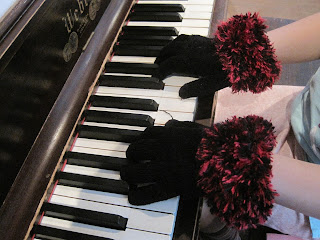Your Piano: Setting Up for a Successful Year
A long, long time ago, I wrote a post titled "Where's Your Piano?" The subtitle was, "Someone Else's Thoughts on Where Your Piano Should Be." As you might guess, I didn't spend much time actually writing that post. Instead, as quickly as possible, I included a link to a different blog that had lots of great thoughts. The only good part about that post was the lovely stock photo of a piano on the beach.
Today is a redo of that post... because simply linking back to that post seriously isn't enough this time. Most of these ideas are not mine. If you click on the above link, and then the link included in that post, you'll discover where I got most of this from. But this time, I'm actually writing it.
So, as you prepare for the school year, here's a few thoughts to make the home practice environment more appealing to your young pianists.
- If you're new to this, and you're looking at getting a piano, get a good one. An acoustic, even an old acoustic, is preferable to a digital. (That's a topic for another day. Even though it probably sounds snobbish, there is actually a good reason I'm saying this.) And you can absolutely look around for a second-hand piano, which is far more affordable than a new one. But a full-sized digital piano with weighted keys and a pedal is preferable to a cheap keyboard. You're investing in an asset. Make it worth the money you're putting into it.
- If you already have an acoustic, get it tuned. If you can find a technician to look at it, even better. Tuners just adjust the strings so they sound right. Technicians are capable of doing repairs and other more in-depth maintenance. You don't need a technician every year (or so I'm told), but if your piano is "new-to-you," it will probably be worth it to go beyond the tuning.
- Where in the house is your piano? You need to find the place that works for you. In my growing up years, the piano was in the living room. This was a nice, central location where the whole family could enjoy it, where I wasn't isolated from everyone else, and Mom could check and make sure I was doing my practice the way I was supposed to without stopping her work. The disadvantage came when I began practicing for hours on end for my exams -- the family found that overwhelming. Now, all three of our pianos (my acoustic, the digital, and the family piano) are all in the basement. This is, of course, primarily because I teach there. But we often hang out in the basement after supper, and my siblings enjoy coming and singing while I'm playing at that time. In short, you don't want your kids to feel isolated while they're practicing, and you don't want them goofing off when you think they're practicing. But if you can't stand the noise right there while you're cooking, don't put it right by the kitchen. Also don't put it by the TV if other family members are constantly using it. *shudders* The TV watchers will be annoyed, and the young musicians will be distracted. It's a lose-lose.
- Have a spot for music books. There are lots of options for this: magazine holders, a special bookcase, or even inside the piano bench if your bench came with storage. No, your kids won't always put their books where they belong. But at least if they ask you, "Mom, where's my repertoire book?" you can ask them, "Well, did you put it away last time you used it?"
- Ideally, keep a pencil close to the piano... if your child is not the sort who will use it to draw on the piano rather than mark down their practice and make helpful notes in their music. :)




Comments
Post a Comment